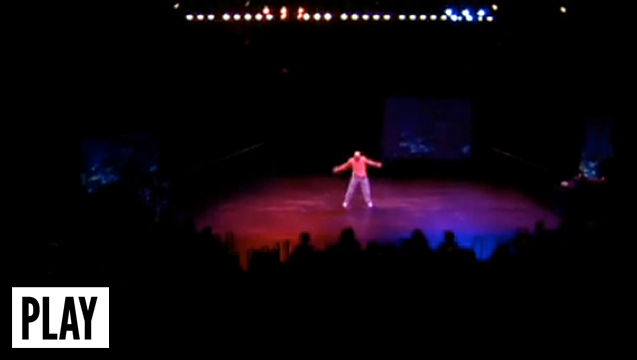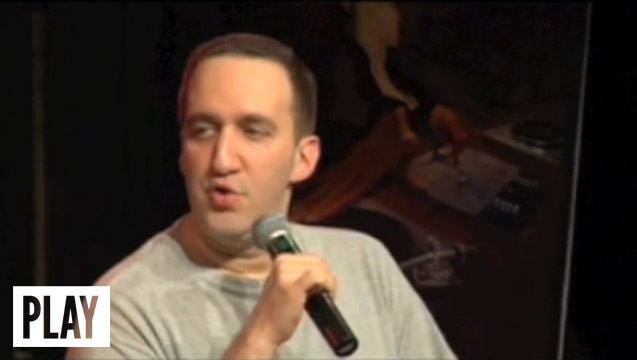...while hop-hop culture has shaped the ethos and maybe the foundation of my interdisciplinary approach, more immediate and urgent to me is that my interdisciplinary engagement derives from my educational practices and understanding of what works in a classroom. I'm a teacher, poet, dancer guy and with multiple tools at my disposal, and inspired by many different art forms and disciplines. As an educator it became incumbent upon me to find multiple ways to create multiple pathways for folks.
TheatreMarcBamuthiJoseph
PB
In talking about your work in high school and college classrooms and as artistic director of Youth Speaks, you've said that you don't teach content. Could you explain this?
...one question for me is: how do I make an opportunity for collective investment inside of an event so that there isn't a static relationship with whatever's being performed?
The push towards engaging multiple disciplines and multiple intelligences is really about finding ways to facilitate collective investment so that the ritual of performance is vital and has agency. The more that I can do that in the performance, the more I can do that in the classroom, the more that I can do that in my life.
I commence to make art in order to make sense...I use performance to make history. This is my pathway to resistance.
"(Yet Another) Letter to a Young Poet," in Total Chaos
PB
One of the critics who wrote about your work said that you were challenging the notions of narrative. I'm not sure what age that critic was. But, I wonder if, in fact there is a generational divide around notions of narrative. In contemporary culture and hip-hop culture, in particular, there's a comfort with a mash up, with a sampled approach, with a mix tape as you subtitled the breaks. I wonder if you have found that in your audiences that as you create work without a traditional narrative arc that it's just part of a younger way of seeing the world.
What I'm doing isn't necessarily the most innovative work. Though it may push boundaries, the question isn't so much about my work, the question is who's watching it. The thing that's edgiest about my work is that it presents an opportunity for institutions to invite a younger, urban audience into the theatre, and, that's actually where culture is made.
Joseph's university classes have included Spoken Word from Gil Scott Heron to Rennie Harris, Body as Text, and Hip-hop Aesthetics. For example:
Post Hip-hop Poetics and Literary Performance; ENG 180A-1, Mills College, Marc Bamuthi Joseph
Intention: This course makes a passionate 14-week argument for hip-hop as form. Participants will engage with leading voices in contemporary performance, production, and pedagogy, ultimately crafting a spoken word poetry set which exhibits hip-hop as modality. We will examine the value systems, market forces, and historical events that have given rise to a hip-hop consciousness. Further, we will individually define hip-hop theatre/education while reacting to the question of generational aesthetics. Once we've established personal theory, we will shift our emphasis to collective performance and pedagogy with an emphasis on spoken word poetry. By semester's end, participants will develop full scripts, and perform scripted excerpts at a reading that the entire class collectively organizes.
Course Reading: Jeff Chang, Can't Stop, Won't Stop; Jeff Chang, Total Chaos; Marc Bamuthi Joseph, the breaks; Alix Olson, Word Warriors: 35 Women Leaders in the Spoken Word Revolution
PB
I was interested in you having started working in the form of spoken word and performance poetry which is generally thought of as a solo form and transitioning into a theatrical form, into a form of hip-hop theatre where really a theatre in essence is about a collaborative endeavor. You started to invite others into your world and to create work collectively. What was that transition like and what are your strategies around working collaboratively?
""PHOENIX""
""Georgia Red Clay""
I hope there's been a consistent progression forward in the direction of dialing the volume down on my own voice and sharing the responsibility and response to a larger idea and then distilling the collective responses and presenting them on stage. When I was in my early 20's, I was part of the National Poetry Slam Scene and went around the country and performed at different poetry venues. I was fortunate in the very beginning of doing this work that I was with Team San Francisco and we won the National Poetry Slam in 1999.
At the time there was no Def Poetry on HBO, there was no Def Poetry on Broadway, nothing like that. Winning the National Poetry Slam was the thing that you could do. So, fairly early in the game I felt pushed to look for new ways to grow in the form and, for me, the way to grow in the form was to think beyond a three-minute arc and to activate the body as a narrative tool.
The reality is that I'm an educator.
Marc Bamuthi Joseph

![]() MBJ on SPARK, produced by KQED in San Francisco
MBJ on SPARK, produced by KQED in San Francisco
How do I make an opportunity for collective investment inside of an event so that there isn't a static relationship with whatever's being performed?
Marc Bamuthi Joseph

![]() Excerpt from The Break/s performed at The Walker Arts Center, 2008.
Excerpt from The Break/s performed at The Walker Arts Center, 2008.

![]() From "Line Breaks"
From "Line Breaks"

![]() Marc Bamuthi Joseph at the Seattle Poetry Slam, 2009.
Marc Bamuthi Joseph at the Seattle Poetry Slam, 2009.